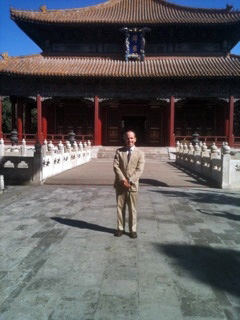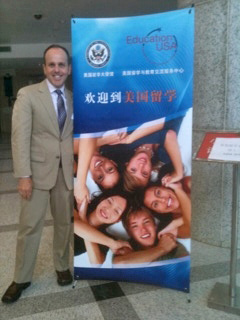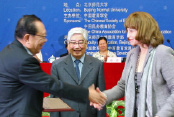Mr. Rock Goes to China
TC's Director of Enrollment Services reflects on a higher ed delegation's recent visit to Beijing and Shanghai
That is how Tom Rock, TC’s Executive Director of Enrollment Services, sums up his trip to China in early September. Rock was one of 18 representatives from 14 U.S. universities, colleges and community colleges who took part in the China Mobile Conference, held in Beijing and Shanghai. The conference was sponsored by EducationUSA, a global network of more than 400 advising centers supported by the Bureau of Educational and Cultural Affairs at the U.S. Department of State.
On the 10-day trip, the group met with Chinese government officials and with educators at Chinese universities, including East China Normal University, the top-ranked teachers college in China, to discuss promoting Sino-U.S. educational exchange. They also met with students during visits to Shanghai University and a high school affiliated with Guangzhou University.
The aim of the visit was to establish an ongoing working group that could increase student exchange and academic collaboration between the two countries. Rock said the delegation functioned as ambassadors to make Chinese educators aware of educational opportunities in the U.S. and to answer questions about the American system. The group also sought to learn about opportunities in China for American students.
“I quickly learned just how popular TC is in China,” Rock said. “Once I introduced myself, there was a line of students, parents and governmental officials who wanted to talk with me. This was especially true at Beijing Normal University, which is one of the premier schools of education in China.”
Many Chinese students want to study at a place like Teachers College and then return to China “to make a difference in the lives of others in their communities,” Rock said. Of all the applications from foreign countries in any given year, TC typically receives the most from China. Meanwhile, U.S. officials, including President Obama, would like to encourage American students to study in China, to improve relationships between the two nations.
TC’s relationship with Chinese educational institutions dates back to the years between 1910 and 1940. During that period of modernization and democratization in China, Chinese educators came to TC to work with John Dewey, Paul Monroe, William Heard Kilpatrick, William Russell, Will McCall, Thomas Alexander, Isaac Kandel and Thomas Alexander, and those same faculty members traveled to China to learn about progress there and to share their skills.
The relationship was reinvigorated in 2000 when Mun C. Tsang founded the Center on Chinese Education at TC to promote an increase in educational exchange between the two countries, including research and development, education and training, as well as outreach and exchange.
In June 2010, President Fuhrman, Tsang and Megan Laverty, Associate Professor of Philosophy and Education, traveled to China to commemorate the 100-year anniversary of TC’s collaboration with China.
Also this summer, the College launched a Pre-College program for Chinese students, a 12-month, academically rigorous program designed to prepare leading high school students from China to attend top institutions of higher learning in the United States. And in September, TC agreed to provide executive management training in China to senior government officials, senior executives of financial and educational institutions and large enterprises. The agreement is part of an ongoing effort, with the Columbia University Business School, to introduce international education resources to the Pudong New Area, the core of China’s designated International Financial Center in Shanghai.
Rock said he found that Chinese students were “ahead of American youth in terms of being good global allies of international and intercultural exchange,” and also more sophisticated in their grasp of the study-abroad process. For example, the delegation received questions about the minimum scores American universities require on the Teaching of English as a Foreign Language (TOEFL) test, and about the details of obtaining a student visa. (Rock’s advice to the students: state clearly on your application why you want to come to the United States.)
Rock wants to go back to China next year, so as “not to lose the energy” generated by this trip. “This delegation was an opportunity to open the dialogue and meet key stakeholders in China,” he says. “I would not have had this level of access nor these pathways opened without the great work of EducationUSA and the U.S. Department of State.”
Published Friday, Nov. 19, 2010



